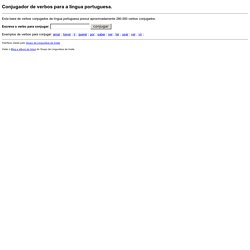

A língua portuguesa. Folha Online - Fovest - Gramática. Portuguese Language TOC. Fonologia: Diferenças entre Inglês e Português. A IMPORTÂNCIA DA PRONÚNCIA INTRODUÇÃO As comunidades humanas, desde suas mais remotas origens, sempre souberam se comunicar oralmente.

A fala é talvez a mais importante das características que distinguem o ser humano no reino animal e que lhe possibilitam se organizar em sociedade. Nem todas as línguas entretanto chegaram a se desenvolver em sistemas escritos. Além disso, não há ser humano normal que não saiba falar sem limitações, porém só recentemente na história da humanidade é que a maioria começou a desenvolver a habilidade de escrever, muitos até hoje com limitações. Jogos lexicais. Gringoes. Conjugador de Verbos da Língua Portuguesa.
Exemplos de verbos para conjugar: amar ; haver ; ir ; querer ; por ; saber ; ser ; ter ; usar ; ver ; vir ; Interface criada pelo Grupo de Linguística da Insite Visite o Blog e álbum de fotos do Grupo de Linguística da Insite.

Portugu s na Internet.